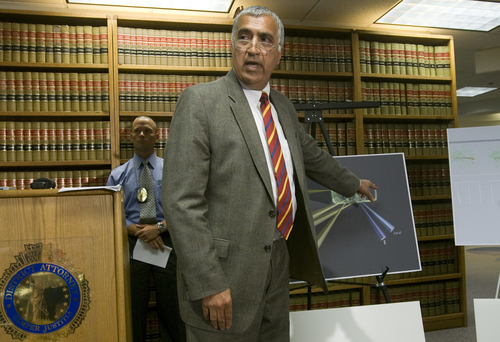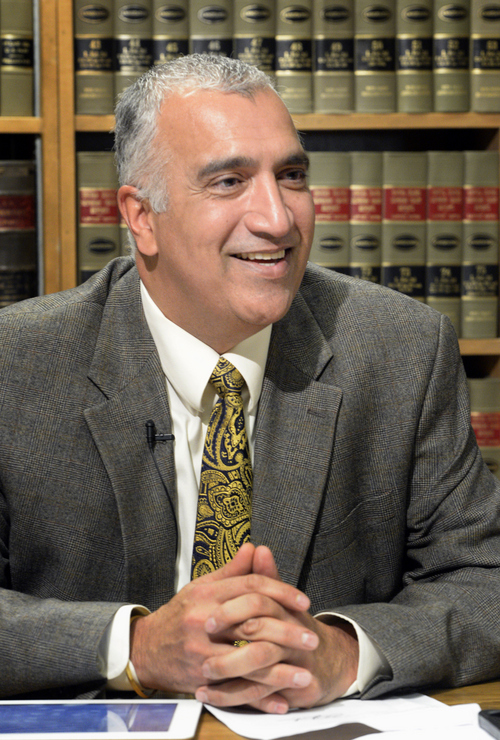This is an archived article that was published on sltrib.com in 2014, and information in the article may be outdated. It is provided only for personal research purposes and may not be reprinted.
In a case that appears connected to some high-profile prosecution, the Utah Supreme Court on Thursday pondered whether the state's grand jury system violates the Utah Constitution.
Justices asked whether a panel of judges that refused to convene a grand jury last year for the Salt Lake County district attorney were acting as the judicial or executive branch. If it was the latter, does that violate the "Distribution of Powers" clause of the state constitution?
"If [the panel] isn't a court," Associate Justice Thomas Lee asked, "then what kind of body is it, and is it a constitutional one?"
The justices will issue a ruling at a later date. Much about the Utah Supreme Court case remains a mystery.
The public briefings say the case originated in October 2013, when Salt Lake County District Attorney Sim Gill asked a panel of state judges to convene a grand jury to consider whether to indict one or more people, whose identities have not been disclosed.
City Weekly reported in January that Gill's office sought a grand jury to consider whether criminal charges could be filed against West Valley City police officers Kevin Salmon and Shaun Cowley,who shot and killed 21-year-old Danielle Willard on Nov. 2, 2012, as the officers were investigating what they thought was a drug deal.
But the public briefings and the discussion before the Utah Supreme Court on Thursday referred to "public officials" and that Gill's office gave "political reasons" for why a grand jury was needed as an alternative to Gill charging the suspects directly.
That suggests Gill could have wanted the grand jury to consider indictments against former Utah Attorney Generals Mark Shurtleff and John Swallow.
Since the Utah Supreme Court case began in January, Gill opted to charge Cowley with second-degree felony manslaughter in connection with Willard's death. Gill decided not to file charges against Salmon.
In July, Gill, a Democrat, and Davis County Attorney Troy Rawlings, a Republican, charged Shurtleff and Swallow, both Republicans, with a combined 23 counts alleging they received or solicited bribes and gifts, tampered with evidence, obstructed justice and participated in a pattern of unlawful conduct. All but two of the charges are felonies.
Grand jury proceedings are not public record in Utah, so the identities of the grand jury targets and many briefings in the Utah Supreme Court case have been filed under seal.
The case has the district attorney petitioning the justices to overturn the panel of judges who denied the grand jury. Lawyers representing the state's judicial branch have responded on behalf of the panel.
Alison Adams-Perlac, a lawyer for the Utah Administrative Office of the Courts, argued that the panel was within its authority to reject the request for a grand jury because the prosecutor did not show "good cause." Adams-Perlac also pointed out that the Legislature did not create an appeal system to review the panel's decisions.
The justices lamented that state statutes do not define what constitutes "good cause" to convene a grand jury or under what circumstances a grand juryshould be convened to"maintain confidence in the justice system" — another criteria to assemble a grand jury.
"Does the prosecutor have to go hire a social scientist to conduct a research poll?" Associate Justice Jill Parrish asked.
Adams-Perlac responded she didn't know what a prosecutor had to show to satisfy the requirements, but said the district attorney's office didn't satisfy them this time.
"Simply providing political reasons," she said, "is not sufficientreason under the statute."
Deputy Salt Lake County District Attorney T.J. Tsakalos told the justices that the panel acts as judges and that the Utah Supreme Court has the authority to overturn its decision under its power to issue what are called "extraordinary writs."
"We had judges, and I think they went astray," Tsakalos said, "and I think you have an opportunity to correct this."
After Thursday's arguments, Tsakalos said attorneys for the judiciary filed a motion claiming the Utah Supreme Court case was moot. The court rejected that motion, Tsakalos said.
Twitter: @natecarlisle





